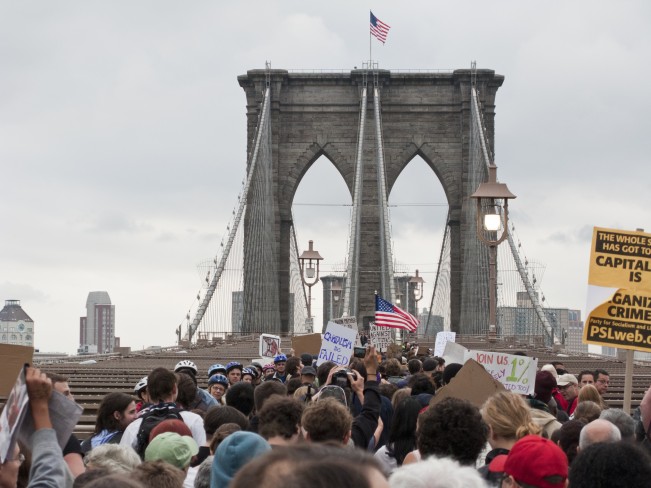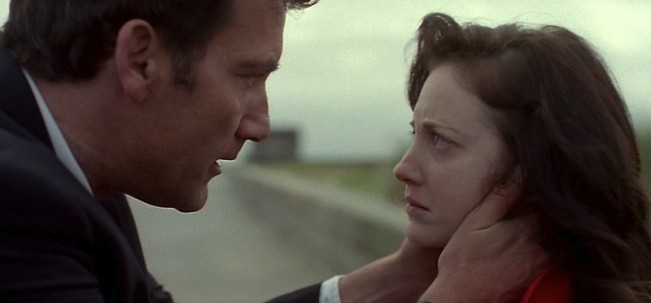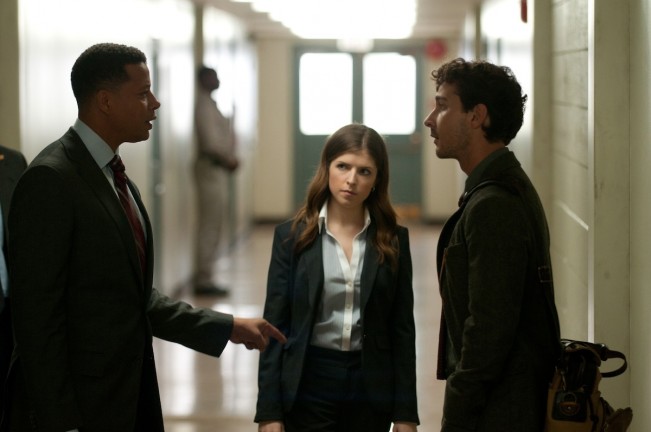

By Ray Pride Pride@moviecitynews.com
Pride’s Friday 5
1. To The Wolf
(TIFF)
Christina Koutsospyrou and Aran Hughes’ To The Wolf, showing in the “City-to-City: Athens” section, is a gem of crafted nonfiction shot in a secluded Greek village where two ragged families of shepherds battle, most members elderly, and all struggle to survive in intense poverty. Without being derivative, the film suggests a meeting of Béla Tarr and Theo Angelopoulos, as weathered and wind-sheared and sopping damp as work by those masters. (There is a wonderful tracking shot in through a flock of sheep on a road that could have gone on for minutes longer, and in fact once did, the directors told me.) The film has a physical austerity to match the fiscal austerity imposed upon the country’s most vulnerable of citizens. I wrote about To The Wolf for Filmmaker magazine from March’s Thessaloniki Documentary Festival. A not-rainy teaser is below.
2. 99% The Occupy Wall Street Collaborative Film
(NY/LA)

Social and political moments with too many moving parts and participants are one of the great casualties of the withering of independent journalism around the world, and especially in this country. The Occupy movement, attempting autonomy without leaders, reflecting general discontent rather than a talking-point chart of specific issues that the press and politicos could preemptively chip away at, suffered from that lack of institutional curiosity. As assembled by directors Audrey Ewell, Aaron Aites, Lucian Read and Nina Krstic, the scrappy, kaleidoscopic 99% The Occupy Wall Street Collaborative Film, which debuted at Sundance, captures the nuance of a range of economic issues with admirable fluency. It’s not so much a matter of admiring the movement as engaging with such a grange of its 2011 efflorescence from Zuccotti Park to cities across the land. Footage from a hundred amateur videographers at dozens of events is assembled with commendable articulacy for most of the running time, but voices onscreen are coherent and often articulate about the punishing economic forces the country faced then, now, and into the foreseeable future. A sound bite from co-director Ewell: “740 people being arrested on the Brooklyn Bridge in New York City in broad daylight apparently wasn’t news. So that night, my film partner Aaron Aites and I went down to Zuccotti Park and filmed. People from all over the country stood up and told their stories of inequality. These were people from all walks of life, all with different issues but all boiling down to the same idea: the system didn’t work for them anymore, and things had been too bad for too long. For them, it was time to take to the streets, raise their voices, and claim their power. Aaron and I were the only people filming that night with a light, and others who were capturing the moment with their phones thanked us for bringing it. It was then that I felt compelled to make this documentary.” The voices heard include many Occupiers, as well as writers Naomi Wolf, Matt Taibbi, and Richard Wilkinson, Heidi Boghosian, Jacob Hacker, Micah White, Nathaniel Schneider, Boots Riley, and Marisa Holmes. The film, not affiliated with the Occupy movement, and released by Participant Media, remains hopeful in its closing moments. That may be its truest grace note. Change is complex. Change takes work. Change? It’s possible. Hooray for change.
3. Salinger
(NY/LA)
Makes me want not to ever hear the man’s name again: Shane Salerno.
4. Shadow Dancer
(DVD/Blu-Ray)
 James Marsh’s substantial skills grow with each film, and he slips readily from an exuberant documentary gem like Man On Wire or the fine Project Nim, to fiction, like Red Riding: 1980 and the sleek conspiracy thriller, Shadow Dancer. Written by former ITN television Ireland Correspondent Tom Bradby, from his 1998 novel, the 1970s-set Shadow Dancer traces the movements of Collette McVeigh (Andrea Riseborough), a single mother in Belfast who’s captured by MI5 after a failed IRA bomb plot in London. Clive Owen plays Mac, the officer tasked with turning her and getting the names of her co-conspirators. Riseborough (striking in stinkers like W. E. and Brighton Rock; gleaming and precise in the recent Oblivion) commands the screen, deftly registering many levels of Collette’s inner turbulence. Suspicions course and paranoia bristles: the plot’s succession of betrayals shift with tectonic suddenness, urged along by Marsh’s elemental yet elegant widescreen compositions. Marsh places the camera with offhand alacrity: it’s always right, especially in a taut opening section that slowly reveals the story’s stakes. And the eye-pleasing production design manages to be suggestive of the period without ever becoming assertive or showy. Alan J. Pakula would’ve liked what Marsh has accomplished here. Cinematographer Rob Hardy (Boy A, The Forgiveness of Blood) makes a fine visual accomplice. With Bríd Brennan, Aiden Gillen, Domhnall Gleeson, and Gillian Anderson as Mac’s calculating superior at MI5.
James Marsh’s substantial skills grow with each film, and he slips readily from an exuberant documentary gem like Man On Wire or the fine Project Nim, to fiction, like Red Riding: 1980 and the sleek conspiracy thriller, Shadow Dancer. Written by former ITN television Ireland Correspondent Tom Bradby, from his 1998 novel, the 1970s-set Shadow Dancer traces the movements of Collette McVeigh (Andrea Riseborough), a single mother in Belfast who’s captured by MI5 after a failed IRA bomb plot in London. Clive Owen plays Mac, the officer tasked with turning her and getting the names of her co-conspirators. Riseborough (striking in stinkers like W. E. and Brighton Rock; gleaming and precise in the recent Oblivion) commands the screen, deftly registering many levels of Collette’s inner turbulence. Suspicions course and paranoia bristles: the plot’s succession of betrayals shift with tectonic suddenness, urged along by Marsh’s elemental yet elegant widescreen compositions. Marsh places the camera with offhand alacrity: it’s always right, especially in a taut opening section that slowly reveals the story’s stakes. And the eye-pleasing production design manages to be suggestive of the period without ever becoming assertive or showy. Alan J. Pakula would’ve liked what Marsh has accomplished here. Cinematographer Rob Hardy (Boy A, The Forgiveness of Blood) makes a fine visual accomplice. With Bríd Brennan, Aiden Gillen, Domhnall Gleeson, and Gillian Anderson as Mac’s calculating superior at MI5.
5. The Company You Keep
(DVD/Blu-Ray)
Among the small, canny things about Robert Redford’s The Company You Keep is the absence of a cast list in the opening credits: it’s the most sweetly starry supporting cast in any recent small-scale movie. (If you want the same eyes-wide surprise I got from the movie, I’ll just say it’s engaging work, before dropping names of the cast, which isn’t top-heavy, but just right, filled with nuanced bits of performance from a raft of seasoned performers.) Okay, ready: Shia LaBeouf is a young journalist for the “Albany Sun-Times,” with a logo much like Chicago’s own Sun-Times. After the arrest of a radical who’s still on the run from a 1960s murder (Susan Sarandon), he’s on the sniff for the big story, aided if not abetted by his skeptical editor, Stanley Tucci. Single father and lawyer Robert Redford is a cautious lawyer who won’t take the case, for reasons relatively easy to surmise. Soon, both he and LaBeouf are on the run, encountering characters played by Chris Cooper, Terrence Howard, Richard Jenkins, Sam Elliott, Stephen Root, Nick Nolte, Brendan Gleeson, Julie Christie and Brit Marling. LaBeouf is ferrety and anxious—then again, that’s his specialty—but the other actors work small wonders with all they’re given in the script by Lem Dobbs (The Limey, Kafka) from a novel by Neil Gordon. (There are implausible turns: note them and savor the better moments.) Cliff Martinez, who’s composed many scores for Steven Soderbergh, as well as contributing to Drive and Spring Breakers, offers a gentle correlative to the best of the writing and Redford’s unhurried pacing.















